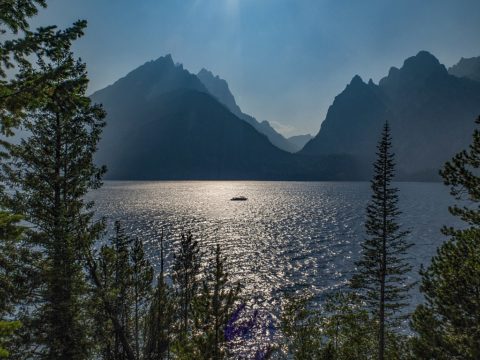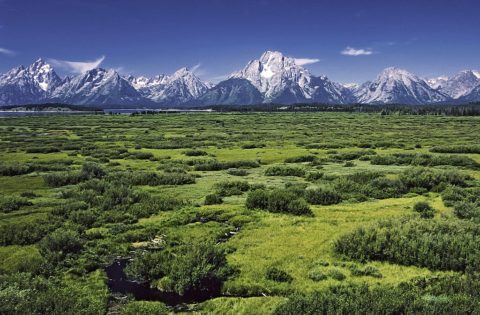The West—and Jackson Hole is no exception—is home to some of the most stunning scenery on earth: jagged, towering mountains; glimmering rivers and tinkling streams; and unspoiled forests brimming with life. They’re the kinds of sights that fuel dreamers and inspire travelers, the stuff of endless John Muir quotes. Not to get all Pocahontas here, but we can’t really own the wild, not really. When you get down to it, we’re all guests here.  So whatever your political stripes, whatever your thoughts on climate change or other hot-button topics, I think we can all agree that our natural landscapes are worth protecting. With that shared concern in mind, here are 7 tips for conservation in Jackson Hole and beyond—ways that each of us can step in and keep the wild West wild.
So whatever your political stripes, whatever your thoughts on climate change or other hot-button topics, I think we can all agree that our natural landscapes are worth protecting. With that shared concern in mind, here are 7 tips for conservation in Jackson Hole and beyond—ways that each of us can step in and keep the wild West wild. Don’t litter.
We’re starting the basics here. We all learned this when we were young, right? When you’re hiking, pack out what you packed in. And Mother Nature doesn’t provide ashtrays, so please find somewhere else to dispose of your cigarette butts. Reduce your personal energy use and carbon footprint.
Burning fossil fuels for energy and transportation can, to put it mildly, have some fairly negative effects on the planet. The good news, such as it is, is that each of us can do our small part in reducing our personal contributions by being more energy efficient. This section could honestly be an article of its own, and maybe soon it will be, but these are all great ways to start. Even taking action in one of the ways we’re about to list is a step in the right direction. Light your house with LEDs, change the filter on your furnace, turn off unused electronics, carpool or use public transit, and—where possible—power your home with clean energy. And make sure to avoid food waste, too—it contributes 8 to 10 percent of global greenhouse emissions. Cut down on paper usage.
Your insurance provider or mortgage lender probably doesn’t want to send you paper bills any more than you want to get them in the mail. Go digital to save paper use and annoyance. It’s 2022, anyway. Unless you just really love the smell of a nice, crisp medical bill, you have no excuse. 
Plant a tree.
Forests cover a third of the earth’s landmass, but each year about 12 million hectares of forest (30 million acres) are destroyed. Nobody expects you to plant 12 million hectares of trees to make up for it. You’re welcome to try if you’ve got a trowel and a few million wheelbarrows of soil lying around—but that’s why it’s up to all of us, not just one person. The earth will be grateful, trust me. Watch your water waste.
The earth has plenty of water, right? Well, not exactly. With historically low water levels around the world, there’s reason to conserve it. Fortunately, it’s not hard to do. Turn off the faucet while you’re brushing your teeth, run the washer and dryer only with a full load, fix leaks around your home, and avoid overwatering your home during peak periods. It also helps to contact your utilities provider and get a report on your water usage. You may not even realize how much water you’re wasting, or how much can be saved with a few simple adjustments. Learn from and contribute to conservation organizations.
Each of us can do a lot in our conservation efforts, but some steps require expert planning, coordination, and knowledge. That’s where conservation efforts in your area come in. There’s nothing wrong with simply making a monetary contribution, but you can also sign up for newsletters and take classes to stay appraised of efforts and opportunities in your neck of the woods. If you live in or near Jackson Hole, for instance, take a look at these organizations and consider learning more about the Jackson Hole Wildlife Alliance, Jackson Hole Land Trust, or Jackson Hole Wildlife Foundation. Contact your representative.
We get it—it’s probable you don’t even like the person who’s supposed to be voting on your behalf in Washington. Maybe you’re routinely embarrassed by them. I’m sure we all have one politician or another who we sorta wish would go quietly retire in Antarctica somewhere, but that doesn't change their job. Educate yourself on environmental issues, write to your representative, and tell them how you’d like them to vote. If they don’t vote the way you want, vote for someone better next time. (Yay, democracy!) Don’t know who your elected representative is? Look at the House of Representatives here and the Senate here. This post was brought to you by Flat Creek Inn, Jackson Hole’s closest motel to Grand Teton National Park and a big supporter of keeping the outdoors the way they are. ---
Ryan Kunz is a copywriter and freelance writer who writes on a variety of topics, including media, the outdoors, and whether or not Darth Vader could beat Batman in a fight. He also lives on the Earth, which makes him a little biased when it comes to writing articles about protecting the planet, but he does it anyway. Photos courtesy of: Burley Packwood, CC BY-SA 4.0 <https://creativecommons.org/licenses/by-sa/4.0>, via Wikimedia Commons I, Michael Gäbler, CC BY 3.0 <https://creativecommons.org/licenses/by/3.0>, via Wikimedia Commons

 So whatever your political stripes, whatever your thoughts on climate change or other hot-button topics, I think we can all agree that our natural landscapes are worth protecting. With that shared concern in mind, here are 7 tips for conservation in Jackson Hole and beyond—ways that each of us can step in and keep the wild West wild.
So whatever your political stripes, whatever your thoughts on climate change or other hot-button topics, I think we can all agree that our natural landscapes are worth protecting. With that shared concern in mind, here are 7 tips for conservation in Jackson Hole and beyond—ways that each of us can step in and keep the wild West wild. 
 So whatever your political stripes, whatever your thoughts on climate change or other hot-button topics, I think we can all agree that our natural landscapes are worth protecting. With that shared concern in mind, here are 7 tips for conservation in Jackson Hole and beyond—ways that each of us can step in and keep the wild West wild.
So whatever your political stripes, whatever your thoughts on climate change or other hot-button topics, I think we can all agree that our natural landscapes are worth protecting. With that shared concern in mind, here are 7 tips for conservation in Jackson Hole and beyond—ways that each of us can step in and keep the wild West wild. 

